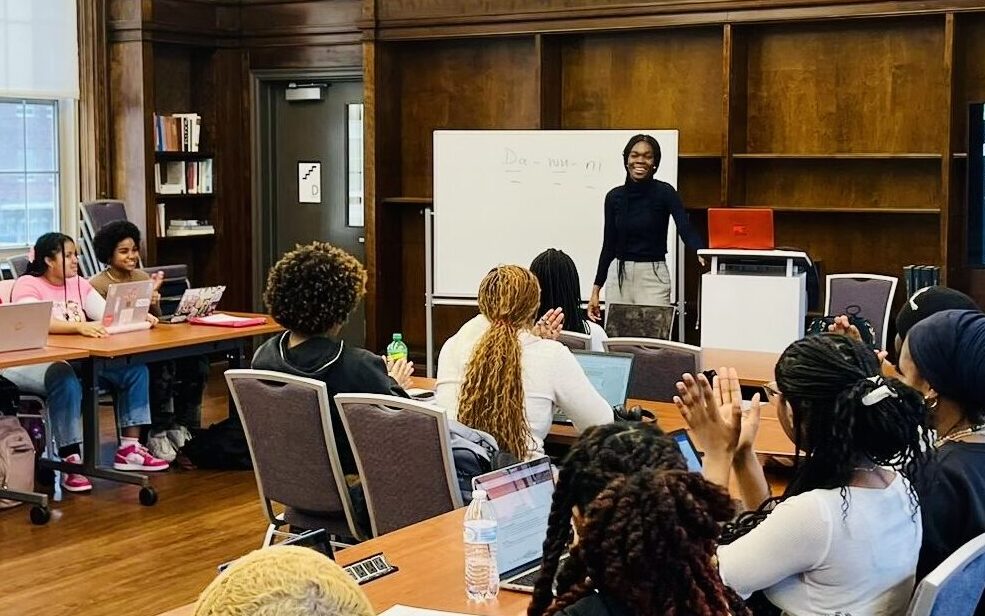Maame Efua Addadzi-Koom, PhD, is a Fulbright Scholar-in-Residence (S-I-R) from the Kwame Nkrumah University of Science and Technology in Kumasi, Ghana. For her Fulbright, she is hosted at Howard University in Washington, DC, where she teaches in the Department of Political Science and alongside faculty at the Center for Women, Gender and Global Leadership.
This interview has been edited for length and clarity.

Can you tell us about what classes you are teaching at Howard while on your Fulbright?
Addadzi-Koom: For this semester, I’m teaching “Women, Gender and Sexualities in Transnational Perspectives;” in the [previous] semester I taught “Gender, Law, and Politics.”
Do you find that you’re teaching in a different way in the United States than you taught in Ghana?
Addadzi-Koom: The course content is different, and so is the way I teach. “Women, Gender and Sexualities” is a newly introduced minor at Howard and was previously taught with a U.S. focus. What I have brought on board since I came is to spotlight the “transnational perspectives” component, which is part of the internationalization process as a Fulbrighter.
The class is on Mondays and Wednesdays, so on Mondays we primarily teach those topics from a U.S. perspective, and then on Wednesdays we do the transnational perspective on the same topic, we call it the TPP (Transnational Perspectives Presentation) . . . usually from Africa or another region in the Global South. Then the students make presentations comparing and contrasting [it with] the US view.
They think about: is it possible to come to a consensus on the issue between the two views? It’s student-led. We just facilitate on those TPP Wednesdays. I say “we” because I’m co-teaching with my host, Professor [J. Jarpa] Dawuni, the founding director [of the Center for Women, Gender and Global Leadership].

One of the big topics in the areas of law and feminism in the United States is the concept of intersectionality [as articulated by legal scholar Kimberlé Crenshaw]. Is that a topic where you’ve been introducing your international perspective with your students?
Addadzi-Koom: Actually, next week’s topic of the course is intersectionality. One of the things that we highlight is that intersectionality in a particular culture or geographic location is very different from intersectionalities in another. So, in the U.S., race would definitely play a role in intersectionality, with class and gender. But on the continent of Africa, because of the different demographics, race would come up in South Africa, some parts of Namibia. But in Ghana you won’t have race, you have ethnicity.
Since you mentioned feminisms as well, we [my students and I] were talking about Western feminisms and African feminisms. African feminism is not necessarily a response to Western feminism but predates Western feminism because of the matriarchal system that we have where people inherit through their mother’s line, and how we have women kings like being depicted in a recent movie [The Woman King, staring Viola Davis, about the west African kingdom of Dahomey].
You mentioned African feminism and your expertise on Ghana. Would you say Ghanaian feminism is different from African feminism?
Adaddzi-Koom: Yes, there are different kinds of African feminisms, and I will speak to that because of my host’s [Professor Dawuni’s] theory on Matri-legal feminism.
When you are born, depending on a culture that you are from, you trace your lineage through your mother’s side or your father’s side. If you trace it through your father side, it’s patriarchy. If you trace it through your mother’s side, it’s matriarchy.
I come from a culture [in Ghana] where we trace it through the mother’s side. Traditionally speaking, and you claim rights on your mother’s side. You claim inheritance on your mother’s side. You just carry your father’s name because of the influence of colonialism.
We have always had that kind of feminism, we just probably didn’t label it like that. And it was empowering to women. And it wasn’t a fight or a struggle and it’s not one [man or woman] dominating the other.
Women in leadership has always been something that has been supported on the continent, because of these systems. When you look at the data on African judges and chief justices, globally, there are more female chief justices coming from Africa than any other place in the world because it’s not new to see a woman at the very top. . . The man is not threatened.

Is there a particular lesson that you think it’s important for Americans to know about transnational feminism?
Addadzi-Koom: At the end of the semester, we are going to ask the question if there is an ‘end of feminism’. . . and if those goals have been reached.
There is still a lot of advocacy to do. The fact that there a few symbolic representations of women in certain places doesn’t mean that is a reality for every woman. We can never say that — because of the optics — that women are overtaking men. That’s not the reality. That’s why we talk about intersectionality and we do not essentialize one [type of] woman, because we’ll all have different experiences. So, I don’t think we’ll ever get to the end of feminism.
The Fulbright Scholar-in-Residence (S-I-R) Program awards enable U.S. colleges and universities to host visiting lecturers from abroad for a semester or academic year. In addition to teaching duties, scholars are engaged in a wide range of activities across campus and within the surrounding community – all with the objective of assisting the host campuses with their internationalization efforts. For more information, on the S-I-R Program, visit https://fulbrightscholars.org/sir.